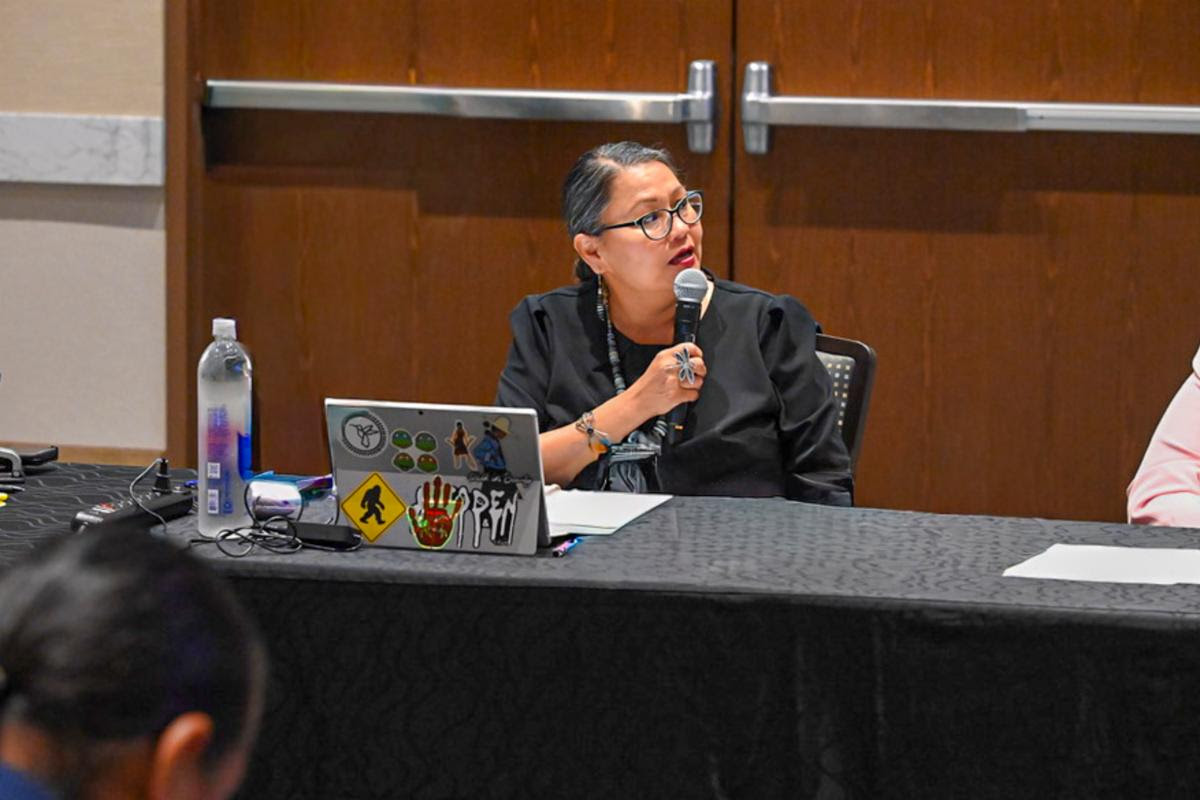
- Details
- By Native News Online Staff
On September 9, Law and Order Committee Chairwoman Eugenia Charles-Newton participated in a high-level meeting with the Coalition of Large Tribes (COLT) and Acting Assistant Secretary for Indian Affairs Scott Davis.
The meeting centered on critical tribal issues, including delays in releasing the federal “Green Book,” internal challenges within the Bureau of Indian Affairs (BIA), persistent underfunding of public safety, and a lack of transparency in federal strategic planning.
Representing the Navajo Nation, Chairwoman Charles-Newton raised concerns about the Green Book, a key resource that outlines internal control systems designed to safeguard public assets. She highlighted that the absence of this document leaves tribal governments without the information they need to make decisions on vital services such as healthcare, education, and law enforcement.
She noted the discrepancy between reports of increased federal funding and the reality tribes are experiencing on the ground, where resources appear to be shrinking. The Green Book, she emphasized, is crucial for tracking the allocation and use of federal funds.
Charles-Newton also requested an update on the Tribal Law and Order Act (TLOA) report, which tribes rely on to evaluate federal impacts on tribal justice systems.
Davis explained that both the Green Book and the TLOA report remain under internal review. While he could not provide a release date, he assured tribal leaders that these documents would be shared with them simultaneously with federal agencies.
During the meeting, Davis acknowledged several systemic challenges, including a backlog of tribal probate cases stretching four to five years, widespread staffing shortages at BIA offices, and deteriorating or condemned tribal detention facilities.
Chairwoman Charles-Newton extended an invitation for Davis to visit the Navajo Nation, underscoring the importance of federal officials witnessing the conditions firsthand. She stressed that such visits are necessary to fully grasp the underfunding of law enforcement and the strain on tribal justice systems.
Leaders from other large land-based tribes—including the Crow Creek Sioux Tribe, Blackfeet Nation, Wind River Reservation, Walker River Paiute Tribe, and Oglala Sioux Tribe—also voiced urgent concerns. These included uranium mining on sacred lands, high staff turnover at the BIA, failing detention facilities, and insufficient funding to respond to law enforcement emergencies. COLT members emphasized the need for the federal government to honor its trust and treaty obligations with meaningful actions, not just words.
Davis reaffirmed that his office remains open to direct communication and committed to advocating for internal reforms that prioritize the needs of tribal nations.
Chairwoman Charles-Newton reiterated the Navajo Nation’s dedication to ensuring that large land-based tribes are not excluded from key federal policy discussions. She affirmed support for COLT’s push for transparency, equitable funding, and meaningful government-to-government consultation.
More Stories Like This
Native News Weekly (August 25, 2024): D.C. BriefsMonday Morning (March 2, 2026): Articles You May Have Missed This Past Weekend
Native News Weekly (March 1, 2026): D.C. Briefs
Scope Narrowed, Report Withheld: Questions Mount Over Michigan Boarding School Study
Zuni Youth Enrichment Project Announces Family Engagement Night and Spring Break Youth Programming
Help us defend tribal sovereignty.
At Native News Online, our mission is rooted in telling the stories that strengthen sovereignty and uplift Indigenous voices — not just at year’s end, but every single day.
Because of your generosity last year, we were able to keep our reporters on the ground in tribal communities, at national gatherings and in the halls of Congress — covering the issues that matter most to Indian Country: sovereignty, culture, education, health and economic opportunity.
That support sustained us through a tough year in 2025. Now, as we look to the year ahead, we need your help right now to ensure warrior journalism remains strong — reporting that defends tribal sovereignty, amplifies Native truth, and holds power accountable.
 The stakes couldn't be higher. Your support keeps Native voices heard, Native stories told and Native sovereignty defended.
The stakes couldn't be higher. Your support keeps Native voices heard, Native stories told and Native sovereignty defended.
Stand with Warrior Journalism today.
Levi Rickert (Potawatomi), Editor & Publisher


